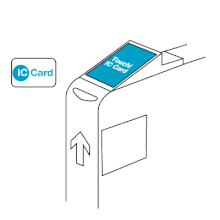Hayakaken
 | |
| Location | Fukuoka |
|---|---|
| Launched | 7 March, 2009 |
| Manager | Fukuoka City Transportation Bureau |
| Currency | Japanese yen |
| Stored-value | Pay as you go |
| Credit expiry | 10 years after last use. |
| Retailed |
|
| Website | http://subway.city.fukuoka.lg.jp/hayakaken/ |

Hayakaken (はやかけん) is a rechargeable contactless smart card ticketing system for public transport in Fukuoka, Fukuoka Prefecture, Japan. Fukuoka City Transportation Bureau introduced the system on March 7, 2009.
Its name stands for quick (速い, hayai), friendly (優しい, yasashii), comfortable (快適, kaiteki), and card (券, ken). Hayakaken (速かけん) also means "Because it's quick" in Hakata dialect.
On March 13, 2010, Hayakaken has been interoperated with two similar cards in Fukuoka—namely nimoca by Nishi-Nippon Railroad (Nishitetsu) and SUGOCA from Kyūshū Railway Company (JR Kyūshū)—plus Suica, a card used in Greater Tokyo Area by East Japan Railway Company (JR East).[1] The card features the face of Chikamaru (ちかまる), the mascot prairie dog of the bureau. Like other electronic fare collection systems in Japan, the card uses RFID technology developed by Sony corporation known as FeliCa.
On March 23, 2013, Hayakaken has also been made interoperable with six other similar cards using the same FeliCa technology, including PASMO, PiTaPa, Manaca, ICOCA, TOICA, and Kitaca. [2]
Usable area
All lines of Fukuoka City Subway, namely Hakozaki Line, Kūkō Line, and Nanakuma Line accept the card.
Types of cards
- Unregistered card
- Registered card: The card can be reissued if a user lost it.
- Commuter's pass: Needs a registration. The card can be reissued.
References
- ^ JR Kyūshū (February 7, 2008). "Official news release" (Press release) (in Japanese). Archived from the original on February 11, 2008.
- ^ JR East (May 18, 2011). "Press release" (PDF) (Press release) (in Japanese).
